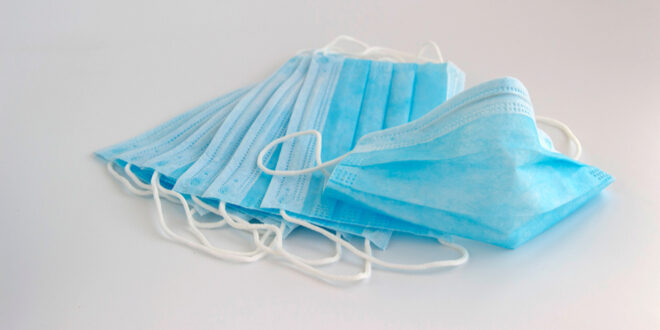Some are thriving, although the problems caused by the worst public health crisis in a century has caused some businesses to rethink themselves and even change course. One businesswoman, Wendy King of OEM Supply King, compared the first months of the pandemic to the Wild West.
In normal times, 2020 would have been an outstanding year for RPP Products Inc. in Bloomington and OEM Supply King as well.
RPP, a company that manufactures and distributes automotive products – mostly oils, coolants and other lubricants – sold in grocery and convenience stores watched its sales increase 25 percent last year compared with 2019 and OEM Supply King’s business was growing steadily.
OEM was mainly a packaging and supply company that, because of COVID-19, has during the past 10 months morphed into a distributor of personal protective equipment.
The company, which does business in the Inland Empire, lost a significant amount of its business when the pandemic struck and virtually all manufacturing stopped, said Wendy King, the company’s founder and chief executive officer.
Faced with that, the company that King began in 2005 had to look for another way to generate revenue. Because it already distributed some medical supplies, OEM began buying PPE – including masks, gloves, hand sanitizers and disinfectants – and put out the word to hospitals that it could supply those desperately needed items.
At which point, OEM’s business model became something out of the wild west, with clandestine meetings and worries about defective products.
“It was like being a mortician after the gunfight at the O.K. Corral,” King said. “The demand was overwhelming, like nothing we’d ever seen. We couldn’t keep up.”
One of OEM’s transactions last spring shows how frantic the personal protective equipment market became.
A large hospital group needed one million masks immediately. King and her daughter, Brandy Romero-Estevez, OEM’s account manager, said they could arrange the transaction. For reasons they didn’t explain, the hospital officials wanted to meet in a parking lot in East Los Angeles, which OEM agreed to do.”
At the meeting, OEM officials represented their would-be client with sample masks.
“There’s a lot of counterfeit on the market, because just about anything can be duplicated, so everything has to be checked,” King said. “You have to make sure it isn’t defective. The fiber in the mask might not be strong enough, or there might not be enough fiber.”
The buyer had 24 hours to decide whether they would buy the masks, but that turned out to be a moot point: before the one-day deadline expired, another entity bought the masks.
“They were all gone, just like that,” King said. “We ended up having a couple more parking lot meetings. Those were a little scary, because you never knew for sure what was going to happen,”
For the next two or three months, until the market settled down, even OEM scrambled to find suppliers, which was a constant struggle. It cultivated some warehouses near the ports of Los Angeles and Long Beach, with limited success.
“We used to buy from 3M, but they we selling exclusively to the government,” King said.
Nearly one year after the World Health Organization declared COVID-19 a pandemic, OEM has now doubled its revenues.
King admitted to some mixed feelings over profiting off a global tragedy, but emphasized the she and her employees are providing essential services that businesses need to stay alive. In addition, her company gave back to the community by donating money to orphaned, abused, and underprivileged children residing in the Inland Empire and Orange County.
They also have helped schools and other public facilities operate more safely, In fact Rim of the World Unified School District Coordinator of Risk Management had this to say about OEM,
“OEM Supply King lives up to its name for PPE materials. Throughout these challenging times, they have been a constant support and assisted with all our safety supplies needed for our staff and students. We have comfort in knowing we can count on them for the best pricing and items will be received timely. They have been here through these tough times to ensure our safety needs were met. We are fortunate to have built a strong working relationship with a company we can count on not only for the safest products but available to us at a great price. As we look to bring students and staff back we will continue to count on OEM Supply King to provide us with the needed PPE materials”
RPP Products Inc. Faces a Similar Covid Economic Challenge
“We made about $30 million more in 2020 than we made in 2019,” said Eric Zwigart, the company’s founder and owner. “In that sense, it was a great year. But to say that explains how 2020 went for us wouldn’t be true, because something went wrong.”
What could be bad about a year where sales rose 30 percent and $30 million more in revenue walked in the door? How about too much of a good thing?
Here is how last year played out for RPP Products, which Zwigart founded in 2007 and today employs about 185 people. Last March, when the World Health Organization declared the pandemic and people began hoarding hand sanitizer. Zwigart made a bold decision: he shifted the manufacturing side of his business away from automotive products and began making hand sanitizer exclusively.
“At one point we worked 15 straight days for 15 hours a day,” Zwigart said. “I retooled the whole company and we were making as much hand sanitizer as we could. We were putting out truckloads a day at one point.”
At first the results were great, as the numbers show. But by early summer demand for hand sanitizer dropped, and Zwigart found himself with too much product and not enough demand.
The problem has not gone away, and now it’s become a threat to RPP Products’ future.
“I have about 400,000 gallons of the stuff that I’m trying to get rid of but I can’t,” Zwigart said. “It’s all sitting in warehouses because I can’t sell any of it.”
RPP Products could lose as much as $10 million if Zwigart can’t find a buyer, or buyers, for his hand sanitizer, which he says has a shelf life of three years.
Zwigart estimates that he has three to four months to fix his problem. After that, he expects to start losing money.
“We’re looking all over the country [for a buyer],” he said. “I had hoped to sell it to the government, or schools, but that hasn’t worked out. Everyone buying hand sanitizer now is buying it from China. It’s very frustrating.”
Probably not many businesses have experienced the “helped-by-then-hurt-by” dynamic RPP Product has experienced in the last six months, but it is not the only business that’s thrived during the pandemic.
With the restaurant industry struggling, businesses like DoorDash, GrubHub have Uber Eats have gained customers during the pandemic. Online retailers, especially Amazon, have done well, dealing another blow to traditional brick-and-mortar retail.
In mid-March, when the COVID-19 lockdowns began, Amazon’s stock price closed at $1,676 per share. By the end of June, its price-per-share had gone up by nearly $1,000.
Netflix added approximately 16 million subscribers during the first quarter of 2020, as theaters began to shut down and people turned to home entertainment to make up for the loss. And anyone who has seen the lines of automobiles waiting to get into In-N-Out Burger knows that not every business has been damaged by the pandemic.
Much of what’s happening to businesses in the current economic slowdown is similar to what happened during the Great Recession, said Mike Stull, director of the Inland Empire Center for Entrepreneurship at Cal State San Bernardino.
“When the economy collapsed 12 years ago, some businesses are able to do well, but some are exactly the opposite,” Stull said. “The ones that are doing well the media doesn’t write about very often. And I’m not saying the media is overplaying the bad news, because it isn’t. This is obviously a very bad situation.”
Asked for a list of businesses in Riverside and San Bernardino counties that have performed well during the pandemic, Stull produced 20. They range from Akash Winery & Vineyard in Temecula to Zwigart’s RPP Products, from Ruff Ready & Moving in Temecula to Mach One Air Charters Inc. in Chino.
“There isn’t a common thread among them,” Stull said. “I suppose there are some businesses that have figured out ways to deal with the pandemic, but some other businesses have found out what they’ve been doing wrong. Stull said. “When that happens a business gets exposed.”
 IE Business Daily Business news for the Inland Empire.
IE Business Daily Business news for the Inland Empire.


